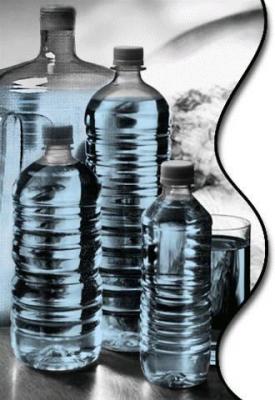The world’s fastest-growing beverage is a boon to the industry but a bust for the environment and for the more than 1 billion people worldwide who lack access to clean drinking water, according to a new Vital Signs Update from the Worldwatch Institute.
Excessive withdrawal of natural mineral or spring water to produce bottled water has threatened local streams and groundwater, and the product consumes significant amounts of energy in production and shipping. Millions of tons of oil-derived plastics, mostly polyethylene terephthalate (PET), are used to make the water bottles, most of which are not recycled. Each year, about 2 million tons of PET bottles end up in landfills in the United States; in 2005, the national recycling rate for PET was only 23.1 percent, far below the 39.7 percent rate achieved a decade earlier.
“Bottled water may be an industry winner, but it’s an environmental loser,” says Ling Li, a fellow with the Institute’s China Program who authored the update. “The beverage industry benefits the most from our bottled water obsession. But this does nothing for the staggering number of the world’s poor who see safe drinking water as at best a luxury, and at worst, an unattainable goal.” An estimated 35-50 percent of urban dwellers in Africa and Asia lack adequate access to safe potable water,
according to Worldwatch’s State of the World 2007 report.
Consumers in industrial countries choose to drink bottled water for taste and convenience, while in developing countries, unreliable and unsafe municipal water supplies have driven the growth in consumption. Yet many poorer people who seek improved drinking water supplies cannot afford the bottled version. Bottled water can be between 240 and 10,000 times more expensive than tap water; in 2005, sales in the United States alone generated more than $10 billion in revenue.
Global consumption of bottled water more than doubled between 1997 and 2005, securing the product’s place as the world’s fastest-growing commercial beverage. The United States remains the largest consumer of bottled water, but among the top ten countries, India has nearly tripled its consumption, while China more than doubled its consumption between 2000 and 2005.
In industrial countries with highly regulated water supplies, tap water has been proven to be just as safe, or safer, than its commercial counterpart. In the United States, regulations concerning bottled water are generally the same as for tap water, but are weaker for some microbial contaminants. The U.S. Food and Drug Administration, which regulates bottled water at the federal level, permits the product to contain certain levels of fecal matter, whereas the Environmental Protection Agency does not allow any human waste in city tap water. Bottled water violations are not always reported to the public, and in most cases the products may be recalled up to 15 months after the problematic water was produced, distributed, and sold.

amen! at the very least, people can buy their own reusable bottles to lug around. or if they’re that vain, buy a fancy-pants bottle of water and just keep refilling it from the tap. who would know?
except paris hilton, and i think she’s kinda busy these days going to jail.
This is great!
I truly believe that tap water has beter quality than bottled water. You can get water quality reports from your local city or county while the bottled water is not easiliy accessible. All that you need is a water purification system for drinking at your home.
Help save the environment.
Check out http://www.esprings.com
The ability to protect yourself is always a concern to everyone. The best way to protect yourself from contaminated water is to filter it before consumption. Most don’t filters don’t do as their proclaimed to do and if they do, they remove most of the essential minerals from the water that your body needs in order to function properly.
You should look for a system that will remove the contaminates while leaving the essential minerals in. That is your best defense to drink truely healthy water.
it’s true that bottled waters are really convenient to use. but what do we think of, the temporary comfort that it provides or the lifetime ease of not using them for the safety of the environment?
i can’t believe people need to write and discuss this. i will never forget the day bottled water came out and i thought HOLY CRAP what’s wrong with people!? we kill the earth in so many ways now we are going to fill landfills with empty water bottles. in a world of scott dallas’ we would have never thought to make bottled water because it isn’t logical to drive, waste gas, pay for water, when it was free out the faucet at my home!!! ILLOGICAL 200%… and furthermore, our cities go to great lengths to provide us clean filtered water. it’s kind of like a slap in the face to them. these companies do not have a magical water source (in FIJI) and they do not care about the quality of the water. they care about SALES. now im writing my own mini blog. i get heated about this.